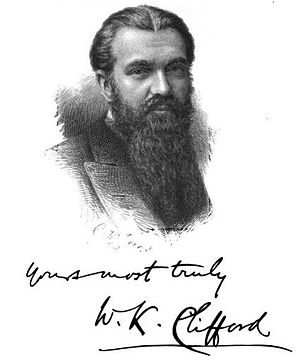William Kingdon Clifford
| William Clifford | |
|---|---|

William Kingdon Clifford (1845–1879)
|
|
| Born |
4 May 1845 Exeter, Devon, England, United Kingdom of Great Britain and Ireland |
| Died |
3 March 1879 (aged 33) Madeira, Portugal |
| Residence | England |
| Nationality | English |
| Fields |
Mathematics Philosophy |
| Institutions | University College London |
| Alma mater |
King's College London Trinity College, Cambridge |
| Doctoral students | Arthur Black |
| Known for |
Clifford algebra Clifford's theorem Clifford–Klein form Clifford parallel Bessel–Clifford function Dual quaternion Elements of Dynamic |
| Influences |
Georg Friedrich Bernhard Riemann Nikolai Ivanovich Lobachevsky |
| Notes | |
|
He was married to the novelist Lucy Clifford.
|
|
William Kingdon Clifford FRS (4 May 1845 – 3 March 1879) was an English mathematician and philosopher. Building on the work of Hermann Grassmann, he introduced what is now termed geometric algebra, a special case of the Clifford algebra named in his honour. The operations of geometric algebra have the effect of mirroring, rotating, translating, and mapping the geometric objects that are being modelled to new positions. Clifford algebras in general and geometric algebra in particular, have been of ever increasing importance to mathematical physics,geometry, and computing. Clifford was the first to suggest that gravitation might be a manifestation of an underlying geometry. In his philosophical writings he coined the expression "mind-stuff".
Born at Exeter, William Clifford showed great promise at school. He went on to King's College London (at age 15) and Trinity College, Cambridge, where he was elected fellow in 1868, after being second wrangler in 1867 and second Smith's prizeman. Being second was a fate he shared with others who became famous mathematicians, including William Thomson (Lord Kelvin) and James Clerk Maxwell. In 1870, he was part of an expedition to Italy to observe the solar eclipse of December 22, 1870. During that voyage he survived a shipwreck along the Sicilian coast.
In 1871, he was appointed professor of mathematics and mechanics at University College London, and in 1874 became a fellow of the Royal Society. He was also a member of the London Mathematical Society and the Metaphysical Society.
...
Wikipedia
